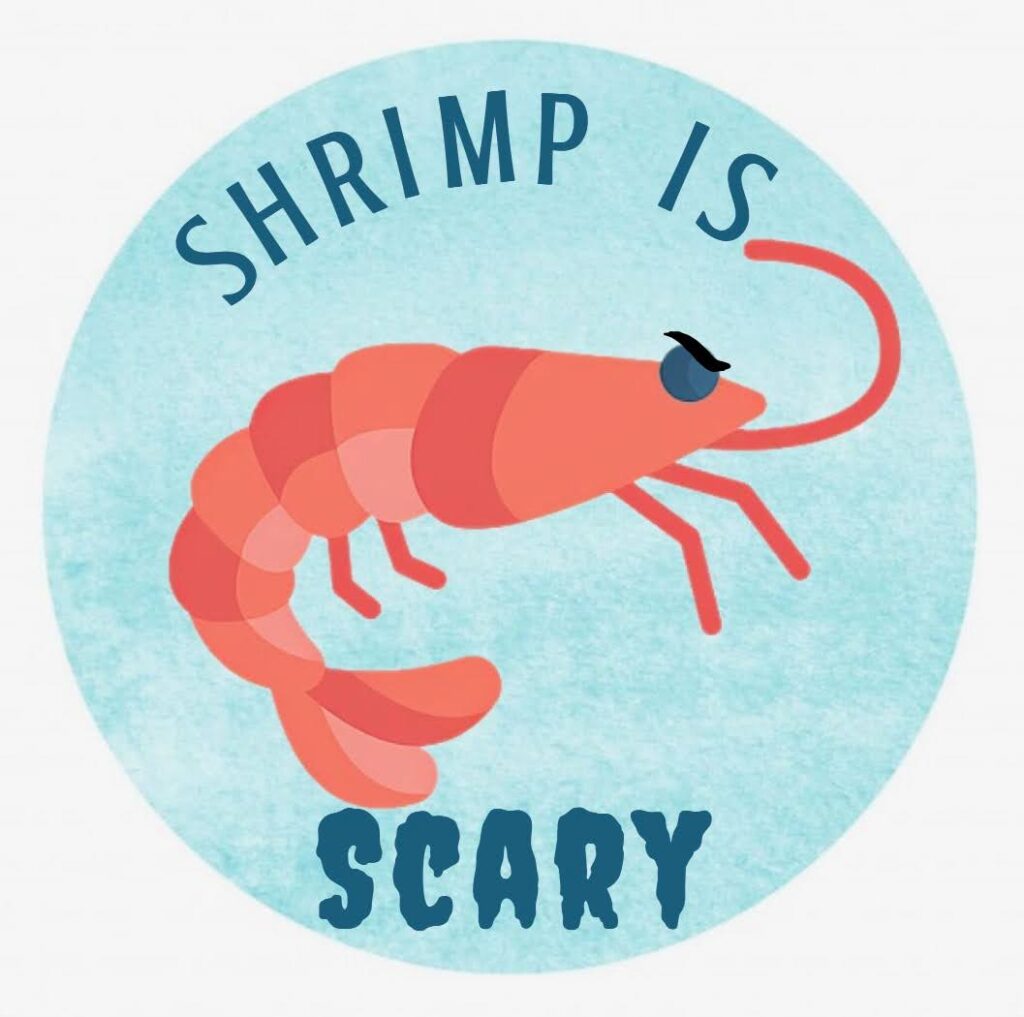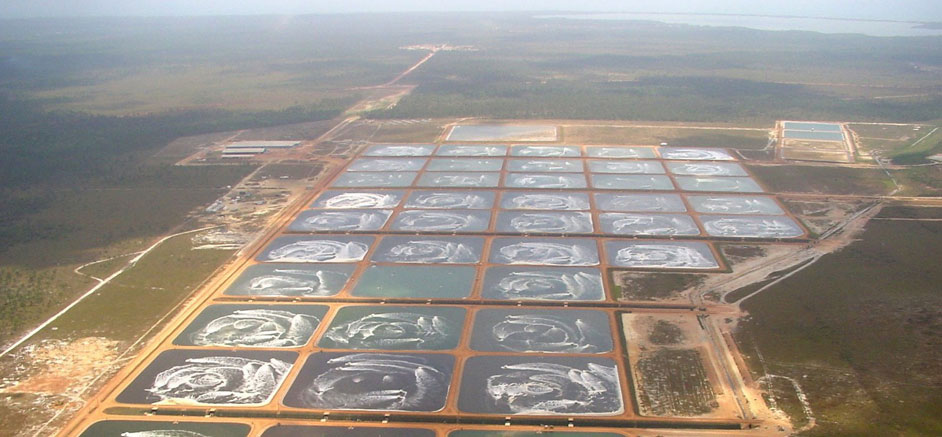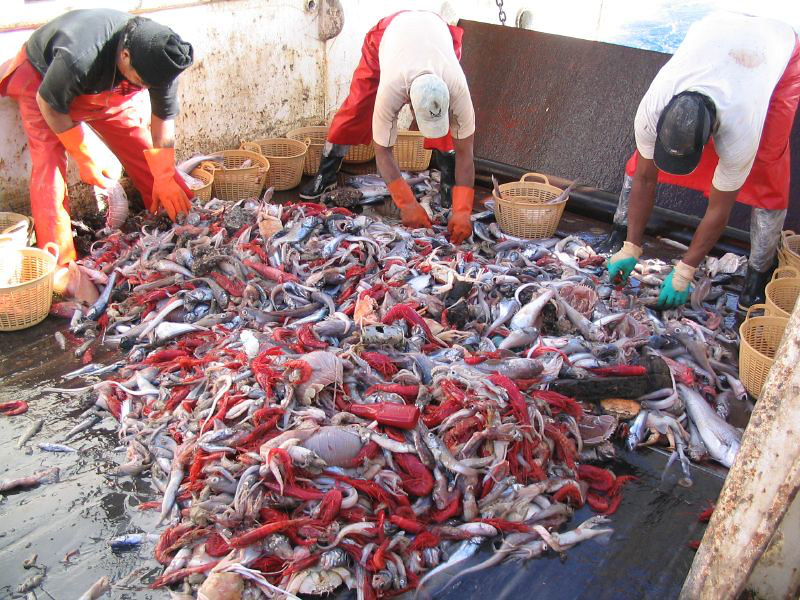By 5C Plant-Based Mission x Sustainabiliteam
Here at Sustainabiliteam and 5C Plant-Based Mission, we like to think we’re brave. But there is one compact crustacean that leaves us quaking in our thrifted vegan boots. Yes, you heard it here first: your fearless campus leaders in the world of sustainability are scared of… shrimp? And we think you should be too.
What is so scary about these petite prawns — which are served at Malott dining hall — is their wide-ranging detrimental impacts, from environmental destruction to human rights violations.
The first set of impacts from shrimp that strikes fear into our hearts is the environmental damage caused by shrimp farms and the sourcing of wild-caught shrimp. While Bon Appetit’s (Malott’s food supplier) website doesn’t specify if their shrimp is wild-caught, farmed, or a combination of both, the impacts are frightening either way.
Ponds used for shrimp farming generate a steady stream of organic waste, chemicals, and antibiotics. This pollution is so severe that the land used for shrimp farming can’t be reused for other purposes. Moreover, ecologically sensitive habitats are affected by land clearing for shrimp ponds, including salt flats, mudflats, estuaries, tidal basins, and coastal marshes, which serve as vital breeding, feeding, and nesting grounds for numerous marine and coastal species.
Moreover, to make matters worse, shrimp farming is the main cause of mangrove loss. Mangrove forests’ unique capabilities for long-term carbon storage make them vital habitats in the fight against climate change. Yet, shrimp farms are causing irreversible damage to these areas leading to their drastic decline. Paired with the carbon emissions of the shrimp industry, the loss of these carbon sinks creates a double fright for citizens concerned about climate change.
In addition, sourcing from wild-caught shrimp doesn’t fare well either. This industry stands as one of the most environmentally damaging seafood harvesting practices. Its primary method, bottom trawling, destroys seafloor habitats and results in extraordinary bycatch — the unintentional capture of non-target species — rates. This bycatch typically includes endangered sea turtles, juvenile fish, and other marine organisms that are then discarded dead or dying after being plucked from the sea.
Additionally, shrimp trawling disturbs sediment, releasing carbon stored in the seabed and disrupting marine ecosystems. The industry also consumes substantial fossil fuels due to the energy-intensive nature of dragging heavy nets across the ocean floor.
There is no doubt that these environmental impacts of shrimp are horrifying, but unfortunately they are far from the full picture. The shrimp industry also hosts a slew of human rights violations, whether you track the supply chain to India, Thailand, or a supposed source of shrimp for Malott: Mexico.
In each of these locations, there are indicators of forced labor, with reports of physically challenging working conditions and unregulated fishing activities. While we are uncertain of Malott’s shrimp’s direct origin from Bon Appétit’s sourcing, we recommend avoiding this seafood product; one is always better off being safe rather than sorry when it comes to potential human rights violations.
But wait, aren’t students met with signs boasting “sustainable seafood” when walking into Malott? Yes, yet these signs should not provide us with comfort but rather a sense of fear, for they appear to be the epitome of greenwashing.
Malott’s sustainability claims are based on Monterey Bay Aquarium’s Seafood Watch Guidelines which include certifications that do not show scientific scrutiny nor guarantee sustainable products. This is because Monterey Bay Aquarium’s Seafood Watch protocol is informed by the certification body Marine Stewardship Council (MSC), a not-so-objective third party between fisheries and retailers/consumers funded by stakeholders in the fishery industry. This bias disrupts the purpose of assigning certification processes to third parties to ensure independent, fair evaluation. In addition, this makes adoption of sustainable reforms in these institutions difficult.
Overall, this allows shrimp companies to buy certifications that lead consumers to believe they are “eco-shrimp” without actually putting their so-called sustainability goals into practice. By digging deeper into the sustainability claims of these companies, one can see these certifications — including the certification Malott uses for shrimp and other seafood — may not be sustainable at all.
Nevertheless, in the possibility that Malott’s certifications are more sustainable than we suspect, we must still look at the sheer scale of seafood being produced by Compass Group (the supplier of Bon Appétit) — billions of pounds each year. No amount of sustainable certification can change the fact that this level of extraction is fundamentally devastating for the environment. Nearly 90 percent of global fisheries are already overexploited or depleted, yet Compass Group USA continues to purchase millions of pounds of seafood each year to meet demand.
A truly sustainable approach would not be to seek “better” fishing methods but to reduce seafood consumption overall, as the immense burden on marine ecosystems is inherently not environmentally friendly.
Our call to action is not for you to cower in fear every time you see the word “shrimp” on the 5C Menu app. No, we want you to join us in our campaign to take shrimp off the menu.
This action would make Malott a more allergy-friendly place (shellfish, anyone?) and more inclusive to vegetarians, vegans, and kosher diets. In addition, this solution is simply the easiest, most cost-effective, and sustainable choice for Malott given its already limited serving of shrimp and the product’s high expense. We also propose that shrimp is replaced with a plant-based option rather than chicken or beef.
This switch to a vegan option aligns with Bon Appétit’s sustainability goals which focus on carbon-reduction.
There are many different ways you can help say no to shrimp at Malott. Dining halls often base the menu offerings on student demand for certain dishes. Therefore, the most powerful action we can take is reducing our demand for shrimp. Don’t ask the dining staff for shrimp, and don’t eat shrimp when it’s offered. Let’s be real, was the seafood medley ever really anyone’s favorite dish?
We urge you to sign our petition (QR CODE!) to tell Malott that students want shrimp off the menu. In addition, we want to collect student input on what plant-based options you would want to replace shrimp. We’ve all seen the horrifying uncanny valley of vegan shrimp, and it is arguably just as scary as the real thing.
Malott should replace shrimp with plant-based alternatives that people will actually eat and enjoy. Instead of firecracker shrimp, let’s offer firecracker tofu. Instead of a seafood medley for surf n’ turf and pasta, what about a hearty medley of mushrooms, soy curls, and hearts of palm? And these plant-based options are endless! Let’s get Malott to offer coconut soy curl shrimp, heart of palm calamari, garlic seared mushroom scallops, mushroom mussels in creamy white wine sauce… the world is our plant-based oyster.
Shrimp is scary, but change doesn’t have to be.






